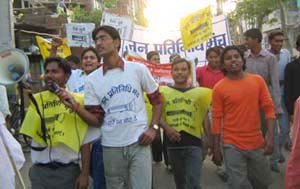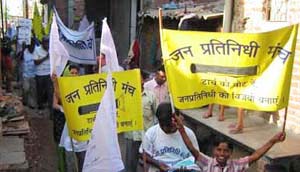
Archive 2009
|
April 16-30, 2007
Delhi Municipal Corporation elections: Anti-democratic character of Party dominated political system and process exposed!
The campaign of the Jan Pratinidhi Manch to select and elect peoples candidates makes a significant advance! The recently concluded Municipal Corporation elections in Delhi once again revealed sharply the completely anti-democratic character of the present party dominated political system and process. At the same time, perhaps for the first time in Delhi, a force emerged on the political arena from amongst the working people which had the courage to take head on this Party dominated political system and process and field candidates for the Corporation elections. As a result a whiff of fresh air was felt in the state of Delhi, with hundreds of people from all walks of life, young and old, women and men, campaigning for an alternative to party rule. The MCD elections took place at a time when the livelihood and rights of the people of Delhi have been under severe attack, as a result of the sealing of shops and small commercial establishments to make way for massive malls and retail outlets of the big multinationals, the ruthless demolition of slums and eviction of thousands of working people with no proper rehabilitation, the vicious attacks on hawkers, vendors and rickshaw pullers, the imposition of a master plan that does not reflect the needs and aspirations of the vast majority of the residents of Delhi but the interests of only the big monopoly capitalists. Both the major political parties, the Congress Party and the BJP had suffered a complete loss of credibility. According to newspaper reports and first-hand accounts, both these parties, ridden by factional infighting, were openly selling their party tickets for lakhs and crores of rupees. They had a hard time finding ‘credible’ candidates to put up for the MCD elections. The weary and lack-lustre election campaign of the candidates of these parties, full of false promises that the people have heard innumerable times before and have ceased to believe in, failed to inspire anyone.
On the other hand, the Jan Pratinidhi Manch, consisting of residents’ organizations across the social spectrum, from upper and middle class colonies to slums and resettlement colonies, boldly launched its campaign of selection of candidates by the residents themselves. This campaign addressed the urgent need to challenge the domination of the narrow, self-serving agenda of the big political parties of the establishment on the residents of Delhi and bring the actual concerns of the people to the forefront by directly involving the people in governance through their own selected representatives, or Jan Pratinidhis. In several wards across Delhi, public meetings of the residents’ ward committees were held, at which the residents selected and put up candidates from amongst themselves. In accordance with the guiding principles of the Jan Pratinidhi Manch, these candidates took a solemn oath before the residents, that they would work for the interests of the people of the ward and be accountable to them, rather than to any political party or vested interest. They also signed an affidavit stating that on being elected, if they failed to perform in the interests of the people of the ward, they would step down from their post. This was done to ensure that the people are able to exercise their control over the elected representative. This won them a lot of respect and support from the people, who clearly appreciated the principled stand of these candidates. Candidates sponsored by Jan Pratinidhi Manch stood for the MCD elections in eleven wards of Delhi. Through street corner meetings, door to door contacts, leaflets, street plays, etc., the candidates of the Jan Pratinidhi Manch and their supporters explained to the people that this initiative of Jan Pratinidhi Manch has been launched to challenge the existing political process. A leaflet distributed in one of the areas explained that “ . . . those candidates, who have spent lakhs and crores of rupees to get the party tickets, would first loot the public to make up this money and would work according to the agenda set by the political party bosses. This is what has been going on for so many years; we are allowed to vote once every five years, but have no say in the selection of the candidates and therefore end up voting for the ‘least evil’. That is how we are completely marginalized from the political process and are deprived of the right to make and implement decisions that affect our lives . . . In complete contrast to the candidates of the political parties, the candidates of the JPM have been selected by the residents from amongst themselves and have to be accountable to the residents for their actions.” The election campaign of the Jan Pratinidhi Manch reflected the boldness and vitality of the candidates and activists and their enthusiasm for taking far and wide the new trend that they are setting. The simplicity and courage of the campaigners, their direct appeal to the best sentiments of the people, their challenge to the established political parties and the existing political process, the bold banners, placards and T-shirts bearing the election symbol “torch”, the catchy slogans, the street corner meetings attended by hundreds of residents, the enthralling street play performances by the youth and children which stripped off the mask of ‘democracy’ of the existing electoral process through many a delightful and comic scene – all this won the hearts of the residents, many of whom contributed generously for the campaign and election expenses of the candidates. The campaign of JPM was carried out with very moderate expenses, met mainly by voluntary contributions from the residents of the ward, in complete contrast to the campaign of the political parties who gave out huge sums of money and other forms of allurement to secure votes. This was such a novel experience in Delhi that even the press and television media had to report on it again and again. The Congress Party, BJP and other established political parties tried many tricks to thwart the campaign of the JPM. The Congress, BJP and other parties of the ruling class could not believe that there was actually a force willing to stand up to them. As most of candidates who stand as independents are either dumy candidates of this or that political party or stand for the purpose of advancing personal agendas, these parties became worried about the political impact of the campaign of the JPM. Apart from the open use of money power and muscle power, which is the norm with these parties and was witnessed amply in these elections as well, nefarious efforts were made to buy off specific candidates supported by the JPM or to put pressure on them to give up. Some JPM candidates and their supporters received threats. However, all the candidates sponsored by the JPM courageously resisted these pressures. On the day of polling, in at least one of the wards where a JPM candidate commanded significant support among the youth, large-scale rigging was organized and provocations were staged, together with fierce police lathi charge on the residents who came to vote. Such incidents were also reported from several other wards across the city, but the state machinery and the media were content with reporting that the “situation had been brought under control”! Such were the “free and fair” elections to the MCD, which brought in a sweeping victory for BJP, replacing the Congress Party that had earlier held sway. The people of Delhi whose homes have been destroyed, shops have been sealed and livelihood taken away, cannot afford to forget that neither the BJP nor the Congress Party politicians came to their aid when they were under attack. Instead, the politicians of both these parties shamelessly took cover behind the Supreme Court orders and pleaded helplessness! Under the present political system, when the anger of the people rises, the ruling bourgeoisie organizes a change of the team in the positions of power through elections, only to continue the same program as before, with different faces. This is what has happened in these elections as well. We cannot expect any let-up in the attacks on our livelihood and rights as a result of the change of team in the MCD. People’s Voice congratulates the Jan Pratinidhi Manch for this extremely important and bold campaign. The campaign launched by the Jan Pratinidhi Manch in the MCD elections 2007 – the selection of candidates by the ward residents from amongst themselves, the steps to ensure people’s control over and accountability of the elected representatives, the participation in the elections on a non-party basis, without the use of money power or muscle power or other forms of allurement – represents an important step in the direction of breaking the stranglehold of the big political parties, who shamelessly serve the interests of the biggest capitalist monopolies, Indian and foreign, in the “name of the people”. The slogan of the Jan Pratinidhi Manch “Party pratinidhi nahin, jan pratinidhi!” (“Not party candidates, but people’s candidates!”) caught the imagination of the residents during the election campaign and is gaining popularity among the masses of Delhi day by day. Each one of the several thousand votes secured jointly by the JPM candidates represents a breach in this party-dominated political process, a call for a thorough-going renewal of this political process and a decisive step in the direction of bringing political power into the hands of the people. The activists of the Jan Pratinidhi Manch have reported that they are summing up their experiences, consolidating their gains and chalking out their plans for taking this campaign widely among all sections of the people of Delhi and other parts of India in the coming months. People’s Voice wishes the Jan Pratinidhi Manch success in its struggle and work to bring political power into the hands of the people. |


